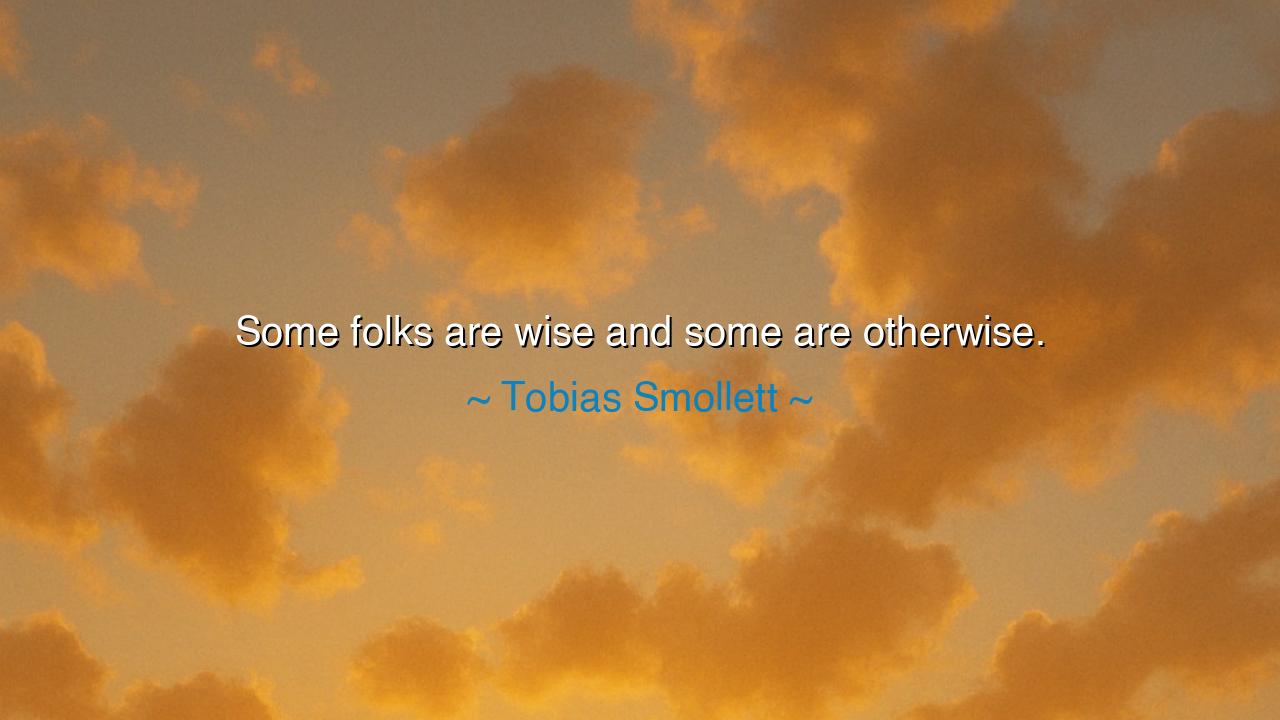
Some folks are wise and some are otherwise.






Wisdom is a rare and precious gem, sought by many but possessed by few. When Tobias Smollett, the Scottish novelist and historian, declared, “Some folks are wise and some are otherwise,” he spoke with sharp wit and timeless truth. His words remind us that the world is filled not only with the truly wise, but also with those who appear wise yet are guided by folly, pride, or deceit. The phrase “otherwise” is both playful and profound, hinting that foolishness often disguises itself in the robes of wisdom, and only those with discernment can tell the difference.
At the heart of this saying lies the eternal struggle between true understanding and illusion. The wise person acts with humility, insight, and foresight, seeing beyond the surface of things. The “otherwise” person, however, may act rashly, speak loudly, or claim knowledge they do not possess. Their decisions bring chaos rather than harmony. Smollett’s concise observation teaches us to look carefully at the character of those we follow or trust, for titles and appearances can deceive, while wisdom is revealed only through action and time.
History offers many vivid examples of this contrast. Consider the tale of King Solomon, who is remembered for his extraordinary wisdom. When faced with disputes among his people, he judged with fairness and vision, earning the respect of generations. Yet history also remembers rulers such as King Louis XVI of France, who, though surrounded by advisors and the pomp of monarchy, was blind to the suffering of his people. His lack of true wisdom helped ignite the French Revolution, leading to the fall of his throne. These stories show how the presence or absence of wisdom can shape the fate of entire nations.
Smollett’s words also serve as a warning in personal life. Many are tempted to seek advice from those who speak with confidence or charm, mistaking loudness for knowledge. But the wise are often humble, listening more than they speak. The “otherwise” may give counsel that leads to ruin, even while believing themselves clever. This is why the ancients taught that the first step toward wisdom is discernment—knowing who truly sees clearly and who merely stumbles in darkness.
There is also a thread of humor in Smollett’s phrasing. His wit suggests that folly is not merely tragic but also common, even inevitable. Not all who are “otherwise” are malicious; many are simply misguided or unaware. This perspective invites us to show compassion even as we remain cautious. For just as we seek to learn from the wise, we must also guard against becoming the “otherwise” through pride or ignorance.
Let this teaching endure: wisdom is a light, but many walk in shadow, thinking they see. As Tobias Smollett reminds us, the world will always have both the wise and the otherwise. It is the duty of each generation to seek the light, to discern truth from illusion, and to walk the path of understanding. For in this choice lies not only personal harmony, but the survival of families, communities, and nations.






AAdministratorAdministrator
Welcome, honored guests. Please leave a comment, we will respond soon